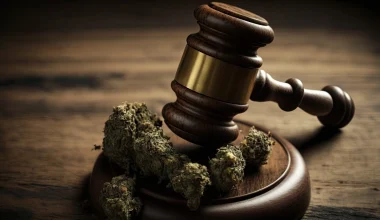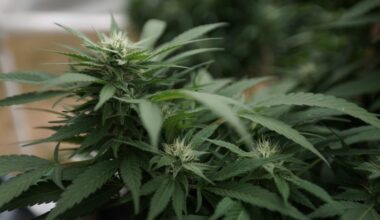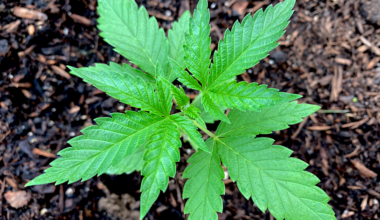New York regulators have issued warnings to more than two dozen businesses that they allege are either illegally selling marijuana without a license or exploiting a “gifting” provision of the state’s cannabis law.
After former Gov. Andrew Cuomo (D) signed an adult-use legalization bill into law last year, adults 21 and older were immediately permitted to possess and publicly consume cannabis, as well as gift marijuana to other adults as long as they weren’t being compensated.
But as regulators work to set up rules to authorize licensed retailers, some businesses are apparently taking advantage of the grey area by offering “free” cannabis gifts to adult consumers who buy other lawful products and services.
New York’s Office of Cannabis Management (OCM) said in a press release on Tuesday that it has sent cease-and-desist letters to more than two dozen companies that are reportedly taking advantage of the gifting provision or otherwise illegally selling cannabis without a license.
Those businesses could lose future licensing opportunities and face fines if they continue the activity, OCM said.
“We have an obligation to protect New Yorkers from known risks and to strengthen the foundation of the legal, regulated market we are building,” Cannabis Control Board (CCB) Chair Tremaine Wright said in a press release. “We will meet the goals of the MRTA to build an inclusive, equitable and safe industry. Therefore, these violators must stop their activity immediately, or face the consequences.”
Today, we sent more than two dozen letters to illicit operators warning them that they’re putting at risk their ability to obtain a license for the legal market while also facing fines and possible criminal penalties: https://t.co/5kL96JskGu
— NYS Office of Cannabis Management (@nys_cannabis) February 8, 2022
“We want to make sure these operators fully understand the law and the consequences they face and now that these letters have been sent, we fully expect them to cease and desist their activities – if they don’t, we will take action,” OCM Executive Director Chris Alexander said.
“New York State is building a legal, regulated cannabis market that will ensure products are tested and safe for consumers while providing opportunities for those from communities most impacted by the over criminalization of the cannabis prohibition, and illegal operations undermine our ability to do that. We encourage New Yorkers to not partake in illicit sales where products may not be safe and we will continue to work to ensure that New Yorkers have a pathway to sell legally in the new industry.”
The regulatory gray space isn’t unique to New York as it works to implement legalization.
Following voter approval of a legalization referendum in New Jersey, the state attorney general similarly sent warning letters to companies that were effectively circumventing the state’s marijuana laws by “gifting” cannabis in exchange for non-marijuana-related purchases such as overpriced cookies, brownies and stickers.
The same regulatory dilemma is playing out in Washington, D.C., where voters approved a measure to legalize marijuana possession, cultivation and gifting in 2014 at the same time that the jurisdiction has been prevented from using its local tax dollars to implement commercial sales due to an ongoing congressional rider.
D.C. lawmakers held a joint hearing in November on a pair of bills to authorize the legal sale of recreational marijuana and significantly expand the existing medical cannabis program in the nation’s capital if that rider is lifted.
Back in New York, lawmakers have introduced several proposals to build upon the legalization law as the state prepares to approve retailers.
—
Marijuana Moment is already tracking more than 1,000 cannabis, psychedelics and drug policy bills in state legislatures and Congress this year. Patreon supporters pledging at least $25/month get access to our interactive maps, charts and hearing calendar so they don’t miss any developments.![]()
Learn more about our marijuana bill tracker and become a supporter on Patreon to get access.
—
Just last week, for example, a New York senator filed a bill that would promote recycling in the marijuana industry once retail sales officially launch.
Sen. Michelle Hinchey (D) is sponsoring the legislation, which would require cannabis shops to apply a $1 deposit for any marijuana products sold in single-use plastic containers and also reimburse consumers for that fee if they return the container.
The senator is also behind a separate bill filed last year that would prioritize hemp-based packaging over synthetic plastics for marijuana products.
The recycling bill is identical to an Assembly version filed by Assemblywoman Patricia Fahy (D) last year.
Another New York senator separately filed a bill in December to make it so that gay, lesbian and bisexual people can qualify as social equity applicants under the state’s marijuana law.
Sen. Jeremy Cooney (D) introduced the legislation, shortly after filing a separate bill to include transgender and non-binary people in the cannabis social equity program. He’s also behind other recent marijuana reform proposals related to cannabis business tax benefits and licensing.
In July, Cooney filed a bill to create a provisional marijuana licensing category so that farmers could begin cultivating and selling cannabis ahead of the formal rollout of the adult-use program.
Cooney is also sponsoring a newly filed bill to allow licensed cannabis companies to deduct certain business expenses on their state tax returns.
Gov. Kathy Hochul (D), who replaced Cuomo after he resigned amid a sexual harassment scandal, has repeatedly emphasized her interest in efficiently implementing the legalization law.
Hochul released a State of the State book last month that called for the creation of a $200 million public-private fund to specifically help promote social equity in the state’s burgeoning marijuana market.
The governor said that while cannabis business licenses have yet to be approved since legalization was signed into law last year, the market stands to generate billions of dollars, and it’s important to “create opportunities for all New Yorkers, particularly those from historically marginalized communities.”
That proposal was also cited in Hochul’s executive budget, which was released last month. The budget also estimated that New York stands to generate more than $1.25 billion in marijuana tax revenue over the next six years.
The state Department of Labor separately announced in recent guidance that New York employers are no longer allowed to drug test most workers for marijuana.
Meanwhile, a New York lawmaker introduced a bill in June that would require the state to establish an institute to research the therapeutic potential of psychedelics.
Another state legislator filed legislation in December to legalize psilocybin mushrooms for medical purposes and establish facilities where the psychedelic could be grown and administered to patients.
Meanwhile, as New York prepares the launch of its adult-use marijuana market, the state Office of Cannabis Management (OCM) announced last week a significant expansion of the existing medical cannabis program.
Now doctors will be able to issue medical marijuana recommendations to people for any condition that they feel could be treated by cannabis, rather than rely on a list of specific eligible maladies.
Medical Disclaimer:
The information provided in these blog posts is intended for general informational and educational purposes only. It is not a substitute for professional medical advice, diagnosis, or treatment. Always seek the advice of your physician or other qualified healthcare provider with any questions you may have regarding a medical condition. The use of any information provided in these blog posts is solely at your own risk. The authors and the website do not recommend or endorse any specific products, treatments, or procedures mentioned. Reliance on any information in these blog posts is solely at your own discretion.







